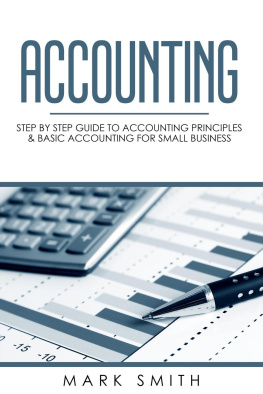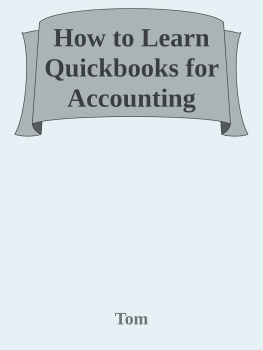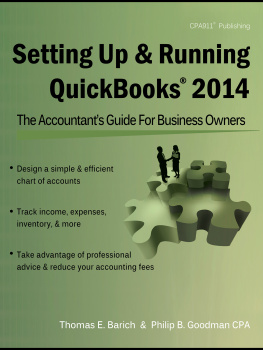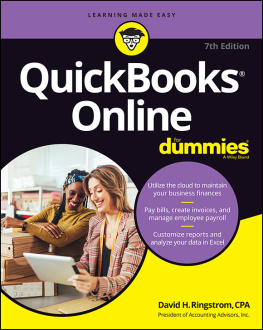ACCOUNTING
2 BOOKS IN 1:
ACCOUNTING PRINCIPLES + BOOKKEEPING & QUICKBOOKS: HOW TO MANAGE BUSINESS FINANCES,AVOID OVERPAYMENTS AND INCREASE PROFITS OVERCOMING EVERY FISCAL OBSTACLE IN THE BEST WAY
CHRIS FINANCE
TABLE OF CONTENTS
I
Chapter4
* Bonus Chapters
-
-
-
-
Chapter48
Introduction
In order to have a successful business, basic accounting principles need to be applied. Accounting is a basic business language, and is relied on to deliver information to different users through financial statements. It is the action or process of keeping financial records.
Financial Statements: Financial statements are a formal record of a
Companys financial activities and position.
Accounting gives us the ability to see profit or loss for a given period. It shows the value and nature of a firms assets, liabilities, and owners equity. Employing a systematic method, accounting identifies measures, classifies, verifies, records, summarizes, interprets and communicates financial information.
Contrary to popular misunderstanding, accounting is not the same thing as finance. While they are two parts of the same picture, there are some key differences. Accounting is the documentation of financial statements recording the day to day transactions of a business. Finance, on the other hand, is the management of assets and liabilities, responsible for decision making and managing cash flow.
There are two basic types of accounting methods. These are cash accounting and accrual accounting.Cash Accounting: The method of cash accounting means that you record income when cash is received and expenses are recorded when
they are paid. This method is usually recommended for small businesses and it shows a clear way to monitor profits and losses.
Accrual Accounting: When using the accrual method, you log transactions as they occur even if the cash hasnt changed hands yet. This method is usually the choice for larger corporations..
There are four basic types of information that is provided by an accounting report, also known as a financial statement. All of this information is important to know, and to understand.
1. Cash Flow: This is the flow of cash coming in and out of business activities including operating, investing, and financing.
2. Results of Operations: This is the net income for a specific period of time. This period of time can be a month, a quarter, a year or any other specific time frame. Net income is the income left after you have deducted all expenses from all income.
3. Financial Position: This will show a companys assets,
Liabilities and capital.
a. Assets are the resources the company currently has;
b. Liabilities are the amount that is owed to third parties; and
c. Capital is the money left over after all expenses have been paid.
d. Solvency and liquidity: This is the ability to pay obligations.
e. Solvency is the ability to pay obligations when they are due; and
f. Liquidity is the ability to meet short-term obligations.
Now that we have a grasp on what accounting is and what information they provide to users, it is important to know who those users are. The users fall into two classifications. Internal and external users.
Chapter 1 An Introduction To Accounting Principles And Important Terminology
What are Accounting Principles?
The term accounting principles might sound odd - and downright scary - to someone who isnt involved in accounting in any way. However, things are much simpler when you look in-depth and understand that accounting principles have been adopted not because someone wanted to terrify young entrepreneurs and beginner accountants, but because they were needed.
In this chapter, we will go through the basic definition of accounting principles, how they came to be, why they are needed, and the two main groups of accounting principles: generally accepted accounting principles (or GAAP) and the alternative accounting principles (a set of accounting principles less common, but which might prove useful under specific circumstances as you read through this book).
Without further ado, lets dive in!
The Definition of Accounting Principles
The simplest way to define accounting principles is by calling them a set of rules created to govern the entire field of accounting. In everyday terms, accounting principles are the very foundation upon
which the more complex (and potentially more intriguing and interesting) regulations created around accounting are built.
Mind you, accounting principles have not always been the same - they were created along the way, as professionals in the field and regulators discovered the need for such rules to be implemented.
In the United States of America today, generally accepted accounting principles (GAAP) are strictly followed by everyone. Even more, if you want your company to be part of the stock exchange, you need to follow these basic rules to a T.
It is important to note that accounting principles are not the same all around the world and that sometimes, the difference between the regulations of one country and another might be staggering. In most developed markets, the principles stay more or less the same, with certain adjustments made to fit the economic and political landscape of those specific countries. In developing markets, however, things might be severely different - and this is why it is crucial that you hire the services of a local accounting expert if you want to expand your business to any other country on Earth.
The institution that deals with creating a uniform set of rules to govern accounting at a global level is called IASB (International Accounting Standards Board), but at the moment, there is no universally accepted set of accounting principles the entire (or at least the vast majority) world abides by.
Coming back home to the US, accounting principles here consist of three main pillars: the basic accounting principles and guidelines (the rules themselves), generally accepted industry practices (how the rules are and should be applied in real life), and the detailed rules issued by the FASB (Financial Accounting Standards Board) and by the Accounting Principles Board (APB).
As mentioned in the beginning, accounting principles have not been created and adopted to torment anyone trying to enter into this field of expertise, but rather with the purpose of helping them. In short, accounting principles help accountants and business owners achieve the following:
Is useful to potential creditors, as well as potential investors, so that they have the full picture of what your business books look like, both from an investment point of view and from that of the cash receipts and economic resources;
As a resource to those who run the company to help them make sane financial decisions - short term and long-term alike;
Is used by those who run the company to help them improve the way the business is performing;
Useful in maintaining clean, clear, and coherent records of
The companys financial state.
Generally Accepted Accounting Principles
If we look at accounting as a house, and consider accounting principles as its foundation, then the generally accepted accounting principles are pillars upon which the foundation is poured.
While not the only principles accountants abide by, GAAP are the principles everyone should follow - especially if the company is public and its financial records have to be available for potential investors, creditors, and shareholders.










![Jane E. Kelly - Bookkeeping and Accounting All-in-One For Dummies [UK edition]](/uploads/posts/book/80164/thumbs/jane-e-kelly-bookkeeping-and-accounting.jpg)

